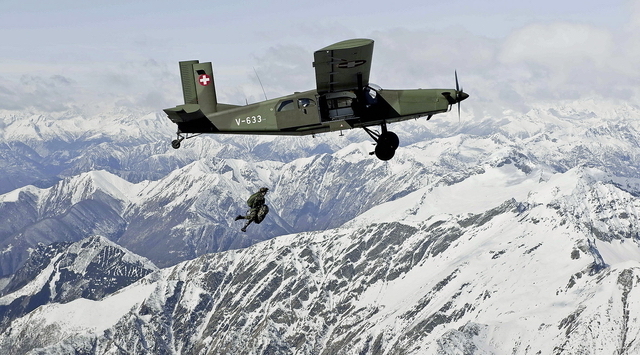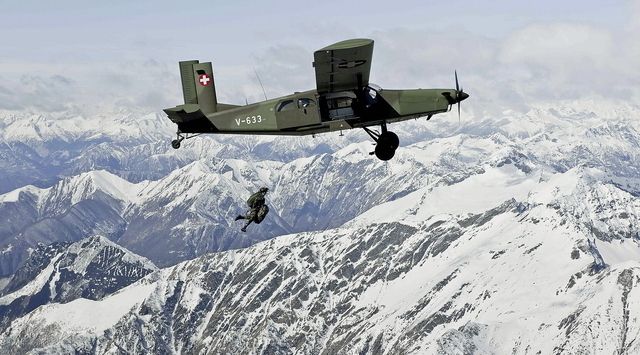Get the weekly SPARTANAT newsletter.
Your bonus: the free E-Book from SPARTANAT.

"The trend towards Special Forces will continue"
The text discusses the dominance of the USA in Special Operation Forces (SOFs) through the perspective of Swiss author Kaj-Gunnar Sievert. It highlights the capabilities and significance of SOFs in asymmetrical warfare and the necessity of regular troops alongside them. The detailed analysis of various SOF operations offers insights for both professionals and lay readers. The trend towards more Special Operation Forces is expected to continue with increasing public access to operation information.
Special forces are deployed worldwide. However, the Americans are the masters of Special Operation Forces (SOFs). Swiss author Kaj-Gunnar Sievert describes the various SOFs from the USA in his book "Everywhere and Anytime" (HERE our book review) in their practice. Sievert, a former commander of the Swiss elite unit Parachute Reconnaissance Company 17, also comes from this SOF practice. SPARTANAT has invited him for an interview and wanted to know how the future role of special forces will change.
SPARTANAT: Your book is called "Everywhere and Anytime" and presents "US Special Forces in Action." Can Americans really be everywhere and anytime?
Kaj-Gunnar Sievert: Of course not. However, the fact is that Americans, as the only superpower, have the ability to be everywhere and act quickly with civilian and military means—including Special Operation Forces (SOFs)—to perceive and enforce their interests. Their various, highly modern sensors and systems allow them to monitor areas within their sphere of interest (almost) constantly and, if necessary, send appropriate resources.
SPARTANAT: The chosen examples are very different: What connects a rescue from a storm by ParaRescueJumpers (PJ) with the sinking of Noriega's escape boat or the killing of Bin Laden?
Kaj-Gunnar Sievert: Although the described missions are completely different, they share some similarities: The circumstances of doing everything—ultimately also risking everything—to successfully carry out a mission; the very high level of training; the use of state-of-the-art resources; the incorporation of experiences from previous missions into training, equipment, and planning; the very high identification of the members of different units with the mission. Ultimately: The realization that certain tasks can only be solved by special units. I chose the case studies from my books based on my personal preferences, making sure to include well-known, less known, successful, and failed operations among them.
SPARTANAT: Special Forces are currently very modern. What makes them so special?
Kaj-Gunnar Sievert: I do not believe that SOFs are particularly "modern" or "en vogue" at present. Specialized formations have been established and used since ancient times. The use of special forces has always had to be seen in relation to the circumstances and possibilities. With the shift from symmetrical (state against state) to asymmetrical warfare (state against groups), the requirements for special forces have also shifted. From my point of view, SOFs are the right answer to the current requirements of asymmetrical wars or operations below the threshold of war. Since at least Desert Storm, there has been a change in understanding within politics and military leadership regarding the necessity of such units.
People are more important than equipment, quality is more important than quantity.
SPARTANAT: Sometimes nowadays it even seems like "special" is the new normal. Why do we still need regular troops if Special Forces can do everything?
Kaj-Gunnar Sievert: To successfully carry out and survive a single operation, a larger operation, or even a conflict/war, the holistic use of resources is crucial. Leaving aside the political considerations and framework, only the deployment of all military means, units, and systems at the right time brings success. In this totality, SOFs are important, but only a part of it. A look at the five truths of special units also shows that "regular troops" are still needed:
1. People are more important than equipment.
2. Quality is more important than quantity.
3. SOF cannot be mass-produced.
4. Capable SOF cannot be created only in emergencies.
5. Most SOF missions require the support of conventional troops.
Correctly and timely deployed, SOF are a true force multiplier in any army and for every army.
SPARTANAT: You describe the individual operations in great detail: What should the professional learn from them, what should the interested lay reader learn?
Kaj-Gunnar Sievert: The interest in special operations is still very high, and there are a number of very good books on various SOF topics. However, books like my series of three published books analyzing operations of special units are rare. With my military background and experience, as well as from conversations with members of special units, I believe that more can be learned from the operations conducted than before.
The professional, whether a member of a special unit or a regular unit, can learn from my books how other units have carried out missions; how they have taken up and considered the circumstances; which aspects were not considered in the planning and what effects the approach may have had; what resources were needed.
The interested reader learns from my books, facts about SOF topics—mainly details of the planning, execution, and analysis of operations; that members of Special Forces are ultimately not superheroes and that losses also occur, as the failed hostage rescue operation in Somalia on January 12, 2013, brutally reminds us.
I hope that both reader groups can spend exciting reading hours with the case studies and feel inspired to buy not just my current but also my future books.
SPARTANAT: Do you believe that the trend towards more Special Operation Forces will continue?
Kaj-Gunnar Sievert: I am firmly convinced of that.
SPARTANAT: You describe Bin Laden's end as if the plan worked without errors. You also note that, at the time of writing, not everything was known. Nevertheless: Where do such detailed information come from?
Kaj-Gunnar Sievert: It has always been the case that more an more information becomes public after an operation. This was also the case with NEPTUNE'S SPEAR. But how do I write my books and which case studies interest me? The rule of thumb "90-9-1" states that 90 percent of the information is public, another 9 percent of information is accessible through the necessary expertise and good analysis, and the remaining 1 percent is truly classified. That means it can only be accessed with insider knowledge of those involved. In my books, I try to evaluate the 90 percent of information correctly and, using my expertise and critical questioning (including in discussions with other specialists), generate added value for my readers.
 KAJ-GUNNAR SIEVERT, born in 1965, has been working in various communication roles within the Swiss Department of Defense since 2001. He is currently the Head of Communication at armasuisse, the procurement and technology center of the ministry. Sievert holds a degree in psychology, business Administration, and journalism from the University of Zurich. The former print journalist regularly writes articles on military topics for Swiss and foreign professional journals and magazines. He has accompanied units and crews from various armies and branches of the military on their missions in different regions of the world multiple times. Sievert is a former commander of the Parachute Reconnaissance Company 17, a parachute special unit of the Swiss Air Force, about which he has also written a book (CLICK HERE). He served in the unit from 1987 to 2000, the last position being its commander. His website is here. The author is also on Facebook.
KAJ-GUNNAR SIEVERT, born in 1965, has been working in various communication roles within the Swiss Department of Defense since 2001. He is currently the Head of Communication at armasuisse, the procurement and technology center of the ministry. Sievert holds a degree in psychology, business Administration, and journalism from the University of Zurich. The former print journalist regularly writes articles on military topics for Swiss and foreign professional journals and magazines. He has accompanied units and crews from various armies and branches of the military on their missions in different regions of the world multiple times. Sievert is a former commander of the Parachute Reconnaissance Company 17, a parachute special unit of the Swiss Air Force, about which he has also written a book (CLICK HERE). He served in the unit from 1987 to 2000, the last position being its commander. His website is here. The author is also on Facebook.
SPARTANAT is the online magazine for Military News, Tactical Life, Gear & Reviews.
Send us your news: [email protected]
Ad
similar
Get the weekly SPARTANAT newsletter.
Your bonus: the free E-Book from SPARTANAT.


